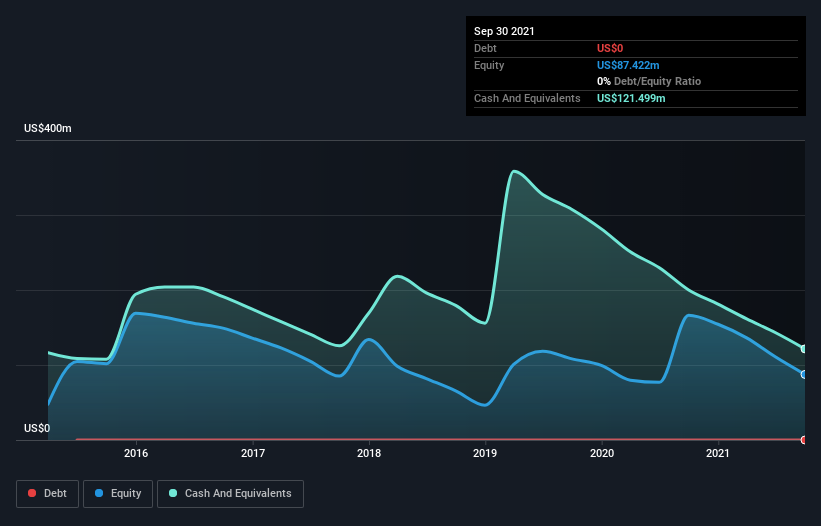Stock Analysis
- United States
- /
- Biotech
- /
- NasdaqGS:VYGR
Companies Like Voyager Therapeutics (NASDAQ:VYGR) Could Be Quite Risky

Even when a business is losing money, it's possible for shareholders to make money if they buy a good business at the right price. For example, although software-as-a-service business Salesforce.com lost money for years while it grew recurring revenue, if you held shares since 2005, you'd have done very well indeed. But while the successes are well known, investors should not ignore the very many unprofitable companies that simply burn through all their cash and collapse.
Given this risk, we thought we'd take a look at whether Voyager Therapeutics (NASDAQ:VYGR) shareholders should be worried about its cash burn. For the purpose of this article, we'll define cash burn as the amount of cash the company is spending each year to fund its growth (also called its negative free cash flow). We'll start by comparing its cash burn with its cash reserves in order to calculate its cash runway.
Check out our latest analysis for Voyager Therapeutics
Does Voyager Therapeutics Have A Long Cash Runway?
You can calculate a company's cash runway by dividing the amount of cash it has by the rate at which it is spending that cash. In September 2021, Voyager Therapeutics had US$121m in cash, and was debt-free. In the last year, its cash burn was US$92m. So it had a cash runway of approximately 16 months from September 2021. While that cash runway isn't too concerning, sensible holders would be peering into the distance, and considering what happens if the company runs out of cash. Depicted below, you can see how its cash holdings have changed over time.

How Well Is Voyager Therapeutics Growing?
Voyager Therapeutics reduced its cash burn by 17% during the last year, which points to some degree of discipline. But we are made wary by the 92% dive in operating revenue over the same period. In light of the above-mentioned, we're pretty wary of the trajectory the company seems to be on. Clearly, however, the crucial factor is whether the company will grow its business going forward. For that reason, it makes a lot of sense to take a look at our analyst forecasts for the company.
How Hard Would It Be For Voyager Therapeutics To Raise More Cash For Growth?
Given Voyager Therapeutics' revenue is receding, there's a considerable chance it will eventually need to raise more money to spend on driving growth. Companies can raise capital through either debt or equity. Commonly, a business will sell new shares in itself to raise cash and drive growth. By comparing a company's annual cash burn to its total market capitalisation, we can estimate roughly how many shares it would have to issue in order to run the company for another year (at the same burn rate).
Voyager Therapeutics has a market capitalisation of US$123m and burnt through US$92m last year, which is 74% of the company's market value. That's very high expenditure relative to the company's size, suggesting it is an extremely high risk stock.
Is Voyager Therapeutics' Cash Burn A Worry?
On this analysis of Voyager Therapeutics' cash burn, we think its cash burn reduction was reassuring, while its falling revenue has us a bit worried. After looking at that range of measures, we think shareholders should be extremely attentive to how the company is using its cash, as the cash burn makes us uncomfortable. Taking a deeper dive, we've spotted 2 warning signs for Voyager Therapeutics you should be aware of, and 1 of them is significant.
Of course, you might find a fantastic investment by looking elsewhere. So take a peek at this free list of interesting companies, and this list of stocks growth stocks (according to analyst forecasts)
Valuation is complex, but we're helping make it simple.
Find out whether Voyager Therapeutics is potentially over or undervalued by checking out our comprehensive analysis, which includes fair value estimates, risks and warnings, dividends, insider transactions and financial health.
View the Free AnalysisHave feedback on this article? Concerned about the content? Get in touch with us directly. Alternatively, email editorial-team (at) simplywallst.com.
This article by Simply Wall St is general in nature. We provide commentary based on historical data and analyst forecasts only using an unbiased methodology and our articles are not intended to be financial advice. It does not constitute a recommendation to buy or sell any stock, and does not take account of your objectives, or your financial situation. We aim to bring you long-term focused analysis driven by fundamental data. Note that our analysis may not factor in the latest price-sensitive company announcements or qualitative material. Simply Wall St has no position in any stocks mentioned.
About NasdaqGS:VYGR
Voyager Therapeutics
A biotechnology company, focuses on the treatment of gene therapy and neurology diseases.
Flawless balance sheet and slightly overvalued.

